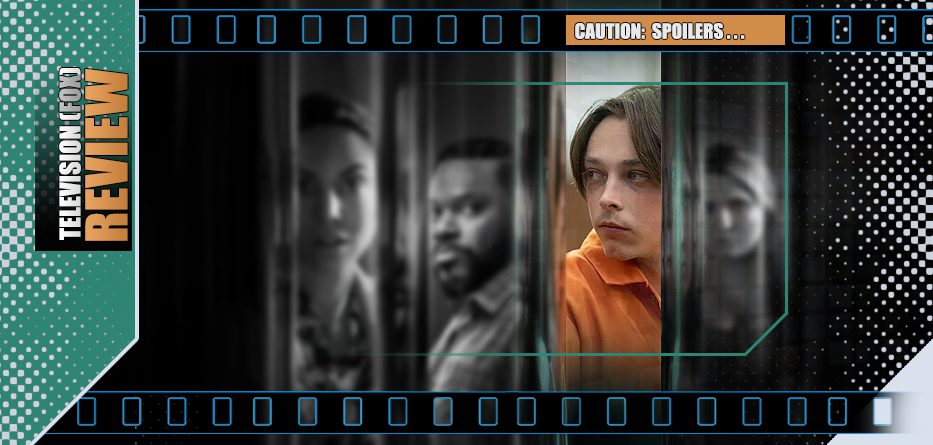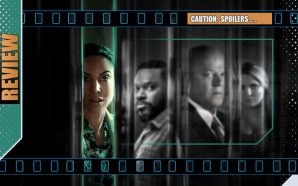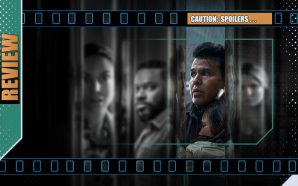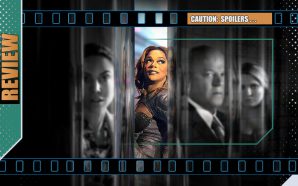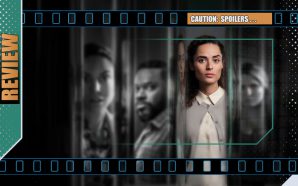Danny is devastated as he realises his days with his doting mother are numbered as she gets weaker and weaker from her cancer treatment. His father reassures him he’s doing all he can, but Danny is no fan of the hospice nurse that hovers around but doesn’t seem to be having any positive effect.
After his mother’s passing, the already outlier student doesn’t handle his grief well and becomes even more angry when he discovers that his father and Alison are in a relationship. How long has this been going on? Has it had an effect on his mother’s treatment? Or is this just an aspect of the grief process made manifest?
As the weeks continue, Alison ends up moving into the family home, but can Danny and Alison have any kind of familial understanding or compromise to live alongside each other? As Danny’s suspicions keep rising, will people help him investigate his claims or is the family history of schizophrenia and his confrontational demeanour going to suggest he’s the one who needs urgent help?
*spoilers*
After a strong start, FOX‘s new legal thriller Accused – looking at the guilt, innocence and the nuanced reasonings and caveats in between – seems to be settling into something rather less unique and far less challenging. The first was a controversial view about trust, alienation and the ease of getting fire-arms, the second episode felt like a movie of the week, looking at perceptions of disabilities and the third, Danny’s Story, feels only slightly removed from a bog-standard pot-boiling Lifetime entry.
Though there’s requisite time spent in the courtroom, it’s disappointing (and, perhaps, somewhat telling) that the legal aspect is actually a minimal part of the story to the extent that you could literally remove every single scene with lawyers and judges and not really alter the tale itself. We start with Danny in jail (as always, we’re not entirely sure of the charges, never mind his culpability to them). In flashbacks, we find that Danny is an obviously troubled kid. He’s a bit of a loner and trying to deal with the declining health of his mother – though it often comes out as sullenness and a hair-trigger temper. He and his mother have always been close and it’s obvious their time is limited. Danny finds himself resenting the way that his mother’s new night-nurse, Alison, seems to be assuming a lot of the responsibilities of her care but possibly not respecting her patient’s wishes.
Acting-wise, it’s a mixed bag. Reid Miller as the troubled Danny is the best thing here – tipping between grief, anger, confusion and resentment and making us concerned for his welfare whatever the truth may be. To his credit, it’s easy to both sympathise and distrust his conclusions. Almost every action around him seems to directly fuel the negatives and the rest can be misinterpreted as either ignorant or manipulative. In short, if you were Danny you could well be behaving the same way for the same reasons, even if you were your own worst enemy in the process… and Reid’s mixture of glances and grimaces sell the idea of him being at the centre of his own personal maelstrom.
Accused has the ability and mission statement to play with our perceptions and our loyalties – breadcrumbing us information and asking us to put ourselves in, alternately, the shoes of the defendant or the investigator and – at its best – exposing our own prejudices and preferences before the last scenes. That is a format rich in potential, yet has to be more than a Scooby-Doo-esque ‘gotcha!‘ guessing game… or to put it another way: you can’t reward and applaud something for a double-bluff if it’s actually no bluff at all….
The problem here is that while Reid is good, the plot is contrived enough and the cascading events are full of so many holes in logic that they undo much of that effort, with the supporting cast left mostly to look on with furrowed brows and look worried.
Rachel Bilson does the best she can with the material she has and for a while it’s genuinely hard to tell whether she’s the innocent target of Danny’s anger or the manipulative psychopath Danny claims? We have obvious suspicions from the start, but as this is Accused, are we being led down the wrong path merely for a ah-ha! moment later? Had she been the innocent party (with the resolution being an examination of the way Danny’s perception of her was slowly, insidiously tainted by his inherited mental illness) then the audience might well have appreciated that they’d been the victims of an unreliable narration and an examination of what it must feel like to have your perceptions askew, but when Alison turns out to be exactly the pantomime villain for exactly the reasons already listed and shown, there’s more of a ‘well, yeah, obviously!’ reaction. Sometimes a double-bluff is nothing more than not bluffing at all.
British actor Jack Davenport (Coupling, Pirates of the Caribbean) is almost unrecognisable as the ineffectual father who’s flailing and failing on a number of levels. He’s been a distant parent to his kids (the mansion they live in suggests his work is profitable and all-consuming) and when it turns out that he’s been involved with Alison for a long time, it doesn’t exactly suggest he has a history of making good choices. He seems genuinely concerned over Danny’s mental health but whether it’s his feelings for Alison or not, there’s no real point where he truly listens to his son until it’s too late to help – his lukewarm parenting stretches, his wanting Danny to see a therapist and a default belief that Danny’s troubled rather than endangered. When he dies off-screen, it’s hard to really care about his fate – it simply makes the character even less interesting and clearly more disposable than ever.
There are so many ways to make the basic story idea interesting in either direction – either as a study of depression and mental illness or as how kids’ views often don’t get as validated as those of adults. What makes this such a disappointment is that it attempts none of this but reverts to cable-movie theatrics. Even with the suspension of disbelief, every possible check+balance is blatantly ignored to make sure the story hits formulaic bullet-points. The diagnosis as potential schizophrenia is yet again the on-screen fit-all, let’s-not-be-too-accurate version, but we don’t see any medical back-up except his lawyer essentially railroading him to an unsuitable plea and a mountain of sedatives. Even if Danny is paranoid then the circumstances surrounding his claims are serious enough to at least be thoroughly investigated. A mother dies more suddenly than expected and her nurse is found to be having a relationship with the father? If someone makes a claim of foul play, it would be checked far more thoroughly. Immediately thereafter the family dog dies too? Tropey red alert! Son gets stomach cramps after eating the nurse’s meal? Hmmmmmmm. By the end we hear the father is also dead and Danny’s brother isn’t feeling well? Ye gods, people, this is all happening in a matter of weeks months – for the love of Angela Lansbury, call CSI! Just to underline the boo-hiss factor, Rachel Bilson slinks into the final scenes and the generically awful, sedative-powered sanatorium, foregoing any sense of nuance and does everything but cackle hysterically after reeling off her plausibly-deniable hit-list. She’s behind you!!!!!!
Accused has the ability and mission statement to play with our perceptions and our loyalties – breadcrumbing us information and asking us to put ourselves in, alternately, the shoes of the defendant or the investigator and – at its best – exposing our own prejudices and preferences before the last scenes. That is a format rich in potential, yet has to be more than a Scooby-Doo-esque ‘gotcha!‘ guessing game… or to put it another way, you can’t reward and applaud something for a double-bluff if it’s actually no bluff at all…
So far, it’s one big hit, one fumble and one wide miss and Accused is very much falling in to a familiar formula that doesn’t challenge our loyalties or perception so much as our patience… it’s time to be smart and subversive, not stale and predictable.
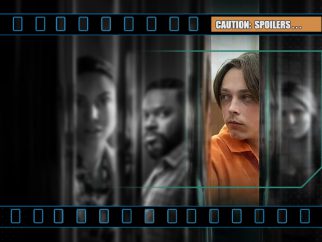
- Story6
- Acting8
- Direction7

